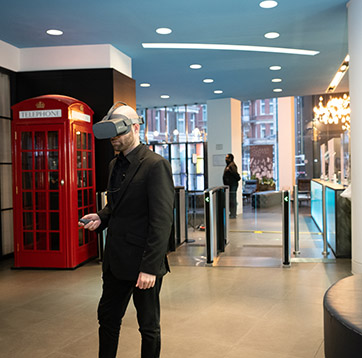The security industry needs to be transformative to respond to an ever-evolving threat landscape, writes Corps Security.
Prior to the era of accredited trainee licenses, poor practice was common – the industry suffered from a poor reputation caused by under-the-table dealing and minimal quality standards. Though the sector’s reputation has improved, last year’s sham training scandal uncovered by the BBC highlights that there is still work to be done.
The issue is further complicated by the expanding role of security officers and the fact that employers are increasingly facing tighter budgets and high staff turnover. For security professionals, soft service skills are more important than ever as officers are often expected to be the friendly face for clients and the first point of contact for the public. They not only need to be communicative and able to resolve conflict, but also require technical skills for alarm receiving systems and building operations.
The rise of hybrid working has made monitoring buildings more complex than ever before. With building occupancy fluctuating depending on office days, especially in buildings occupied by multiple companies, it’s difficult to anticipate the level of protection needed. When occupancy is low, the threat of theft, vandalism, or hostile reconnaissance could rise.
These issues are multi-faceted and suggest a need for lower-cost, fast, and comprehensive training methods for security personnel. One solution is to adopt innovative e-learning Virtual Reality (VR) programmes.
The capabilities of VR
VR technology is not new, but its recent adoption in soft service industries has greatly enhanced the training of employees. The limitations of in-person training during the pandemic accelerated its popularity as the industry grew by 50 per cent in 2020 alone.
VR developers like MoonHub work closely with clients to develop catered and immersive training scenarios. Working with Corps Security, it has replicated multiple threat scenarios including patrolling, managing protests, dealing with suspect packages, working with aggressive customers, fire prevention checks, radio protocols, bag search protocols, hostile reconnaissance awareness and more.
MoonHub’s partnership with Corps won an Outstanding Security Performance Award (UK OSPA) in 2023. The combined team was recognised for working together to deliver training that brought the scenarios to life for trainees. Previous training methods were simply less effective at replicating the hands-on work officer do every day.
The results
VR technology has been found to increase trainee retention by up to 75 per cent in comparison to the 5-10 per cent standard for traditional methods. That statistic alone highlights how effective the training can be.
E-learning programmes are a significant investment but over time, these methods are up to 64 per cent less expensive than traditional training methods. VR training can keep officers up to date with security measures and practices by creating fully immersive training scenarios. This training can also be up to four times faster than traditional learning methods.
Perhaps most impressively, PwC reported that those who have taken part in VR training are 275 per cent more confident in their knowledge. For the security industry, cultivating the confidence, approachability, and proactivity of security personnel develops enhanced protective measures.
VR technology is not widely used yet, and sham training methods still pose a threat to the industry However, VR training will provide an alternative solution to the cost and time pressures faced by security firms and their clients at an economically unstable time.










